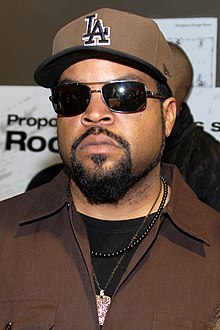
Back Ice Cube Afrikaans Ice Cube AN آيس كيوب Arabic آيس كيوب ARZ Ice Cube AST آیس کیوب AZB Айс Кюб Bulgarian Ice Cube BS Ice Cube Catalan ئایس کیووب CKB
Ice Cube | |
|---|---|
 Ice Cube in 2014 | |
| Born | O'Shea Jackson June 15, 1969 Los Angeles, California, U.S. |
| Education | Taft High School Phoenix Institute Of Technology |
| Occupations |
|
| Years active | 1986–present |
| Organization(s) | Cube Vision Lench Mob Records |
| Spouse |
Kimberly Woodruff
(m. 1992) |
| Children | 5, including O'Shea Jr. |
| Relatives | Del tha Funky Homosapien (cousin) Kam (cousin) |
| Musical career | |
| Genres | |
| Labels | |
| Member of | Mt. Westmore |
| Formerly of | |
| Website | icecube |
O'Shea Jackson Sr. (born June 15, 1969), better known as Ice Cube, is an American rapper, songwriter, actor, and film producer. His lyrics on N.W.A's 1988 album Straight Outta Compton contributed to gangsta rap's widespread popularity,[1][2][3] and his political rap solo albums AmeriKKKa's Most Wanted (1990), Death Certificate (1991), and The Predator (1992) were all critically and commercially successful.[3][4][5][6] He was inducted into the Rock and Roll Hall of Fame as a member of N.W.A in 2016.[7]
A native of Los Angeles, Ice Cube formed his first rap group called C.I.A. in 1986.[8] In 1987, with Eazy-E and Dr. Dre, he formed the gangsta rap group N.W.A.[8] As its lead rapper, he wrote some of Dre's and most of Eazy's lyrics on Straight Outta Compton,[1][3] a landmark album that shaped West Coast hip hop's early identity and helped differentiate it from East Coast rap.[2] N.W.A was also known for their violent lyrics, threatening to attack abusive police which stirred controversy.[1][8] After a monetary dispute over the group's management by Eazy-E and Jerry Heller, Cube left N.W.A in late 1989, teaming with New York artists and launching a solo rap career.[8]
Ice Cube has also had an active film career since the early 1990s.[9][10] He entered cinema by playing Doughboy in director John Singleton's feature debut Boyz n the Hood, a 1991 drama named after a 1987 rap song[2] that Ice Cube wrote.[9] He also co-wrote and starred in the 1995 comedy film Friday,[11] which spawned a successful franchise and reshaped his public image into a bankable movie star.[10] He made his directorial debut with the 1998 film The Players Club, and also produced and curated the film's accompanying soundtrack.[12] As of 2020, he has appeared in about 40 films, including the 1999 war comedy Three Kings, family comedies like the Barbershop series, and buddy cop comedies 21 Jump Street, 22 Jump Street, and Ride Along.[11] He was an executive producer of many of these films, as well as of the 2015 biopic Straight Outta Compton.
- ^ a b c Steve Huey, "N.W.A: Straight Outta Compton", AllMusic.com, Netaktion LLC, visited 14 Jun 2020.
- ^ a b c Loren Kajikawa, "Compton via New York", Sounding Race in Rap Songs (Oakland: University of California Press, 2015), pp 91–93.
- ^ a b c Todd Boyd, Am I Black Enough for You?: Popular Culture from the 'Hood and Beyond (Bloomington & Indianapolis: Indiana University Press, 1997), p 75 skims Ice Cube's early successes in music, while indexing "Ice Cube" reveals analysis of his political rap.
- ^ Lakeyta M. Bonnette, Pulse of the People: Political Rap Music and Black Politics (Philadelphia: University of Pennsylvania Press, 2015), p 71.
- ^ Allen Gordon, "Ice Cube: Death Certificate (Street Knowledge/Priority, 1991)", in Oliver Wang, ed., Classic Material: The Hip-hop Album Guide (Toronto: ECW Press, 2003), p 87.
- ^ Preezy Brown, "18 socio-political lyrics from Ice Cube's 'Death Certificate' that still resonate in 2016", Vibe.com, Prometheus Global Media, LLC., 1 Nov 2016.
- ^ "N.W.A | Rock & Roll Hall of Fame". www.rockhall.com. Retrieved April 26, 2021.
- ^ a b c d Steven Otfinoski, "Ice Cube", African Americans in the Performing Arts (New York: Facts On File, Inc., 2003), p 108.
- ^ a b Gail Hilson Woldu, The Words and Music of Ice Cube (Westport, CT & London, UK: Praeger Publishers, 2008), pp 44–45.
- ^ a b David J. Leonard, "Ice Cube", in Mickey Hess, ed., Icons of Hip Hop: An Encyclopedia of the Movement, Music, and Culture (Westport, CT: Greenwood Press, 2007), p 311.
- ^ a b Cashmore, Pete (November 30, 2018). "Frozen in time: Why does nobody want to hear Ice Cube rap any more?". The Guardian.
- ^ Kubernik, Harvey (2006). Hollywood Shack Job: Rock Music in Film and on Your Screen. UNM Press. ISBN 978-0-8263-3542-5.
© MMXXIII Rich X Search. We shall prevail. All rights reserved. Rich X Search